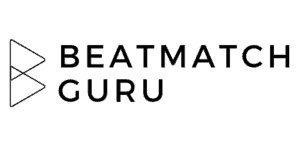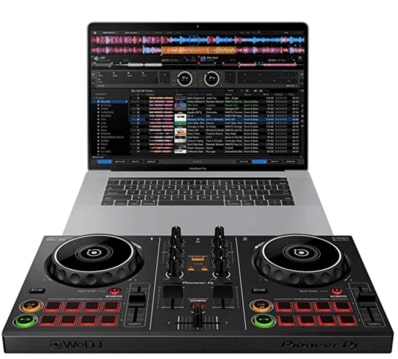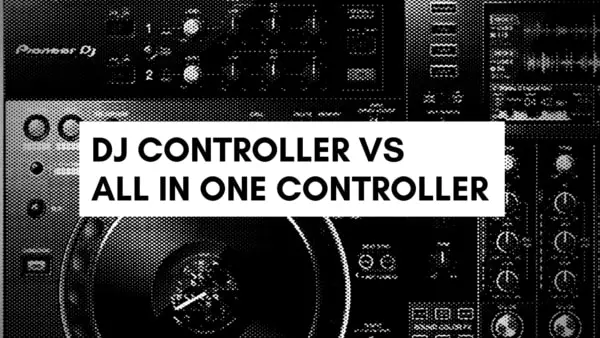
DJ controller technology seems to be evolving and improving at a noticeable rate each year. Keeping up with all the DJ controller releases and advancements sometimes seem confusing and tough to keep up with, even financially unattainable at times.
Here are some key differences between a DJ Controller Vs All In One DJ Controller:
| Category | DJ Controller | All-In-One DJ Controller |
|---|---|---|
| Price | Affordable | High Price |
| Requires laptop | Yes | Not Essential |
| Channels | 2 to 4 | 2 to 4 |
| Connectivity | Limited | Connects to CDJs, DVS Turntables |
| Music | Requires Laptop | USB Sticks or Laptop |
| Digital Displays | Sometimes | Yes |
| Output/Inputs | Limited to RCA Usually | Options: RCA, XLR, 1/4″ Jacks |
If you’re just simply interested in the differences or are in the market for purchasing a new DJ Controller, then you’re in the right place. With so many controllers out there on the market, this guide will make it clearer between what DJ controllers and All-In-One controllers are.
Let’s delve into the differences between DJ Controller Vs All In One DJ Controller. Might even add in the differences of CDJs too 😀
DJ Controller

Definition
A DJ controller is a single unit that contains a mixer and two turntables (jog wheels). Mixers can range from 2-channels or 4-channel mixers.
Most DJ controllers contain audio interfaces which means no external hardware is needed. Simply plug and play. DJ controllers primarily connect to a laptop (although some models connect to a phone or tablet e.g. Pioneer DDJ-200).
DJ controllers can typically range from very basic to super professional in models / variants e.g. the Pioneer DDJ-200 to the Pioneer DDJ-1000.
Features
Common basic DJ controllers feature the below:
- Two Jog Wheels (advanced controller feature digital displays)
- 2-Channels
- EQ controls
- Pitch shift tempo sliders
- FX pads
- Master FX controls
- Access to DJ software to download onto laptop
- USB connection
- RCA outputs
Equipment Setup
The main setup of DJ controllers consists of connecting the DJ controller to speakers (for example to speakers via an amp, or directly into powered speakers).
Then connecting a laptop to the DJ controller via a USB cable, allows a DJ to gain access to DJ music. DJ software such as Rekordbox or Serato is usually the way that DJs organise, categorise and control music when DJing via a DJ controller.
DJs can connect to mobile smartphones or tablet devices but does depend on the type of DJ controller.
Music Input
Music is inputted via a DJ software on a laptop for example. You can buy and download music to then play music via the DJ software that’s loaded.
Streaming music via music subscription services, such as Sound Cloud or TIDAL, is always an added bonus if you are subscribed.
This is not a unique feature of a DJ controller though, more a point around DJ software allowing you to access music from a few sources regardless of your DJ controller type.
Price
Starting at basic DJ controllers £100 is feasible, moving to mid-range between £250 to £600, then higher end more around £1,500+. Featured below are some models that fall within these pricing categories.
| DJ Controller | Price |
|---|---|
| Pioneer DDJ-200 | £138 / $149 |
| Pioneer DDJ-400 | £200 / $249 |
| Pioneer DDJ-FLX6 | £539 / $600 |
| Pioneer DDJ-1000SRT | £1,200 / $1,300 |
DJ controllers have been around for a while now which helps with the amount of DJ controller options and brands competing in the market, hence why there’s such as wide range of prices / options of DJ controllers. All beneficial for us DJs of course.
Suitability
DJ controllers are on offer in quite the range meaning affordability allows new DJs to buy one.
More advanced DJs have options to purchase DJ controllers too to gain access to more advanced features such as more input/outputs, channels, FX controls and digital displays.
In light of that, DJ controllers are certainly suitable for the beginner DJs, intermediate and advanced.
Although I’d question how many DJs professionally DJing want to be taking a laptop with a DJ controller (similar to DVS setup I know) but with All-In-One DJ controllers being easier upon setup, DJ controllers could be much more suitable for the beginner and intermediate DJs.
Let’s face it, it all comes down to personal preference and which devices you prefer to use.
Check out my DJ gear recommendations for my top advice on which DJ controllers, CDJs and mixers to get hold of.
All-in-One DJ Controller
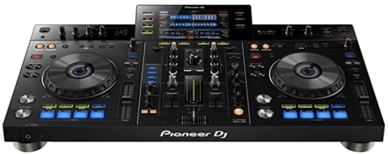
Definition
An All-In-One DJ controller is it’s own working unit, it houses everything a DJ controller has and the computer also. Meaning that no laptop is required.
Functionally the All-In-One DJ controller is fantastic for a DJ that’s not into using a laptop next to you when performing. Allows more focus on DJing other than starring at a laptop screen, you can perform more as a DJ.
An extra feature of the All-In-One DJ controller (at least the high end All-In-One DJ controllers that is) is the flexibility of connecting to extra devices and turntables. CDJs, turntables and beat pad machines can be connected to via the extra channels and ports available.
Features
Common features of the All-In-One DJ Controller.
- Two Jog Wheels
- 2 or 4 channels on mixer
- EQ controls
- Pitch shift tempo sliders
- FX pads
- FX master controls
- Advanced filter / FX controls
- LCD Touch Screen (No need for Laptop)
- Built in DJ software
- USB stick ports (for music files)
- USB connection for laptop (when & if desired)
- RCA outputs (Master & Booth)
- XLR master out
- RCA Input / Output for connecting DJ turntables/CDJs
Equipment Setup
All-In-One DJ controllers require being plugged in for power, then connecting to all the essentials such as DJ speakers and headphones. As mentioned, no connecting to a laptop at all (but is possible if desired due to the DVS setup).
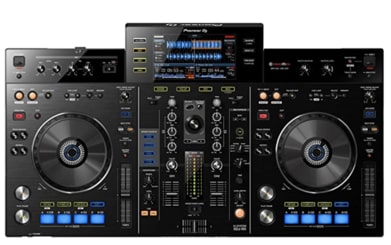
Extra options include connecting to more than one set of DJ speakers. Connecting to booth monitors can be possible, especially important for connecting to speakers in the DJ booth at venues, e.g. weddings, clubs and bars etc.
Higher end specifications of All-In-One DJ controllers offer 4-channels giving greater connectivity to other turntable device types, these include…
- 2 x CDJs
- DVS setup = 2 x turntables
- Beat pad machine = 1 or 2
Example 1

Example 2

Music Input
Music input is slightly different in the fact that it’s possible to connect two USB sticks into the All-In-One DJ controller. There’s a bit of work that you’ll need to do before plugging in by preparing DJ music onto the USB sticks, but that’s it.
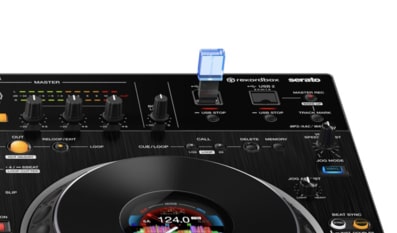
Of course it’s still possible to access subscriptions streaming services to start DJing instantly, via Rekordbox or Serato for example.
Price
The price ranges of All-In-One DJ controllers ranges from around £600 for very very basic older model looking controllers, to upper ranges being in between £1,000 to £2,200.
Below are some models that you can consider researching more into, especially to help fit your budget.
| All-In-One DJ Controller | Price |
|---|---|
| Denon DJ Prime Go | £899 / £999 |
| Denon DJ Prime 4 | £1,678 / $1,850 |
| Pioneer XDJ-RX2 | £1,529 / $1,650 |
| Pioneer XDJ-XZ | £1,899 / $2,000 |
Suitability
Suitability of All-In-One DJ controllers appear to offer less options on the market (at this point in time at least, in 2021). Meaning the price is fairly substantial in the high end region between £1,000 to £2,200.
There are some All-In-One DJ Controllers that are lower in price, but I question the quality of those controllers.
The greatest thing about the Pioneer controllers in general is that they resemble CDJs a lot! Where as a Denon DJ Prime Go has super small jog wheels in comparison, making it less transferrable when moving from bedroom to club for example.
All-In-One DJ controllers are certainly going to be more attractive to DJs that play out as mobile DJs, wedding DJs and potentially bar DJs too.
If you have the money and don’t want to DJ using a laptop then the All-In-One DJ controller is certainly for you. It’s certainly peaked my interest as the whole using a laptop at a gig is annoying at times.
Check out my DJ gear recommendations for my top advice on which DJ controllers, CDJs and mixers to get hold of.
Other DJing Options to Consider
Still on the fence? Here are some other options to consider when DJing. Some of these options might suit your DJing needs better than DJ controllers or All-In-One DJ Controllers.
CDJs & Mixer
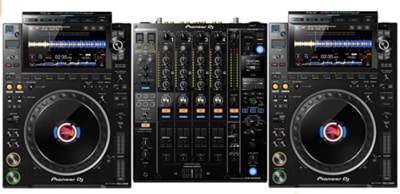
CDJs (and XDJs) are pretty much the industry “club” standard and are featured widely in most DJing environments.
CDJs are fairly expensive, at around nearly $700 a CDJ, plus a mixer you’re hitting the territory of buying an All-In-One DJ controller. I wonder if that’s the whole purpose of the All-In-One Controller, especially the recent Pioneer XDJ-XZ that can connect turntables and other CDJs to it.
The great thing about CDJs is they are separate to the DJ mixer, giving you the freedom of choice when buying a mixer.
DVS
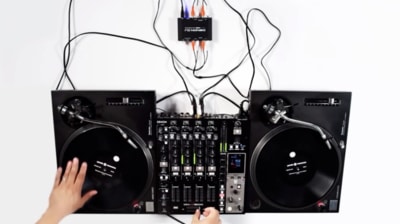
Digital Vinyl Systems are still here in the world of DJing, with new technology released in DJ mixers allow DJs to plug and play straight from the mixer. No need for an external audio interface makes it easier for DJs to set up now.
If you didn’t know already, DVS allows you to play digital music via DJ software but with a time encoded record vinyl. Serato is the DJ software and external audio interface that I’ve used in the past. Denon DS1 seems to be quite popular online these days, check it out here.
At the moment it’s possible to pick up a DVS setup for around $400-500, £250-£350 in the UK.
If the traditional DVS setup looks too complicated (which when setting up in a club is grim), like I’ve mentioned the DJ mixer (Pioneer DJM-S3 Serato DJ Mixer) solution could be the one for you. Here’s what that setup might look like.
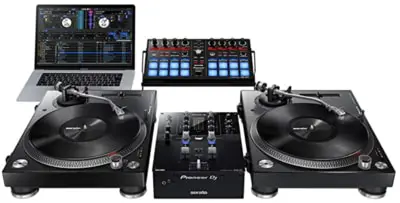
Related Questions
What is the difference between a DJ mixer and a DJ controller?
A mixer is simply a stand a lone piece of equipment that allows turntables and CDJs to be plugged into it. Then allowing DJs to mix music together using the stand a lone mixer. DJ Controllers in comparison comprise of two turntables and mixer built in one.
Do I need a mixer with my DJ controller?
A DJ controller has a built in DJ mixer and turntable jog wheels, meaning that a separate DJ mixer is not required.
